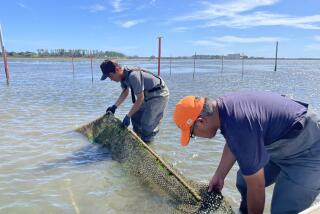A New Crisis Shakes the Japanese
- Share via
Just as the Japanese people were beginning to regain confidence after last year’s devastating Kobe earthquake and the Tokyo subway gas attack, a seemingly unstoppable food poisoning crisis is shaking their trust in the government once again. Belatedly, Prime Minister Ryutaro Hashimoto is stepping up efforts to find the source of the sometimes fatal bacterial illness. He has felt the heat of the modern Japanese, who are shedding their traditional passivity and demanding more of government.
The outbreak is drawing particular attention because infections by this unusually virulent strain of E. coli are on the rise worldwide. The scourge, which until recently had been linked to only 100 cases a year in Japan, has sickened 8,500 Japanese in the past two weeks, beginning with a siege on schoolchildren in the town of Sakai, near Osaka. The deaths of a 10-year-old girl and an 85-year-old woman last week brought fatalities to seven since May, when the accelerating food poisoning cases first came to the attention of health officials. The Health Ministry ordered local governments to tighten controls on school lunches in mid-June, but it did not issue a public alert even after the number of cases rose.
Since mid-July, an estimated 6,000 children have been sent to hospitals with diarrhea, vomiting and fevers after they consumed school lunches prepared by city-run kitchens that had ignored a directive to avoid distributing uncooked foods.
So far, the source of the bacteria, often associated with uncooked meat, has eluded researchers in all but an isolated case in which a 9-year-old boy became ill after eating raw cow’s liver, a delicacy in Japan.
And the worst may be coming. Hashimoto warned that the outbreak was not expected to peak until August, Japan’s hottest month, when food poisoning usually reaches its highest level. Tokyo, meanwhile, has contacted the National Institutes of Health and the U.S. Centers for Disease Control and Prevention, which has experience in tracking the elusive E. coli. In 1993 the bacteria caused the deaths of four children and sickened 500 other people who had eaten undercooked fast-food hamburgers in Washington state.
In Japanese culture, which prizes orderliness and cleanliness, the social chaos created by the invader is putting Tokyo’s crisis management to a severe test. Critics say the government’s slow reaction has echoes of Kobe and the subway terror. The Tokyo bureaucracy often proves unwieldy in emergencies, but it is responding now, and the health and education ministers have apologized. Apologies, however, might not be enough in modern Japan.
More to Read
Sign up for Essential California
The most important California stories and recommendations in your inbox every morning.
You may occasionally receive promotional content from the Los Angeles Times.













